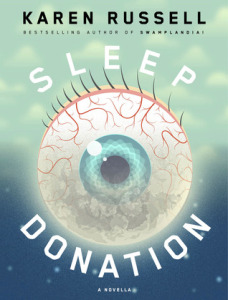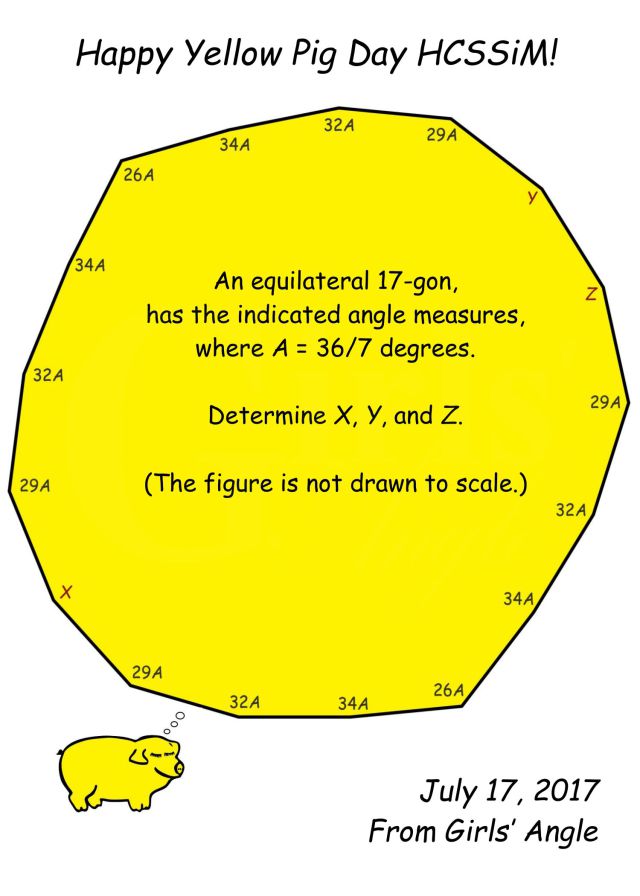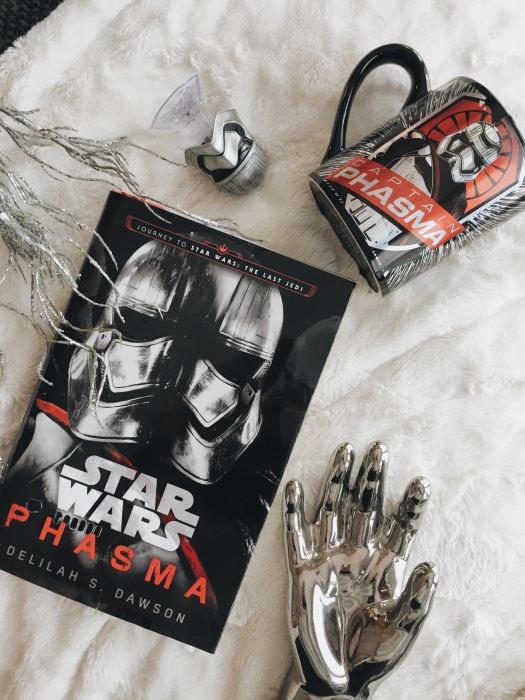 Note: A draft went up yesterday instead of the actual review. Many apologies!
Note: A draft went up yesterday instead of the actual review. Many apologies!
20 Books of Summer: Book 9
Karen Russell’s Sleep Donation has all the same problems as Swamplandia! but with a fraction of the page count. Don’t spend your time on this book. Its premise may entice you and the first quarter may draw you in, but the rest is mess of plot holes and weak characters. There’s no closure either, so there isn’t a prize for reaching the last page. This review is a mini So Bad, I Read It For You post and contains lots of spoilers. I would have done a full write up, but I didn’t want to reread Sleep Donation to pull quotes. Summary from Goodreads:
A crisis has swept America. Hundreds of thousands have lost the ability to sleep. Enter the Slumber Corps, an organization that urges healthy dreamers to donate sleep to insomniacs. Under the wealthy and enigmatic Storch brothers, the Corps’ reach has grown, with outposts in every major US city. Trish Edgewater, whose sister Dori was one of the first victims of the lethal insomnia, has spent the past seven years recruiting for the Corps. But Trish’s faith in the organization and in her own motives begins to falter when she is confronted by “Baby A,” the first universal sleep donor, and the mysterious “Donor Y.”
Sleep Donation explores a world facing the end of sleep as we know it, where “Night Worlds” offer black market remedies to the desperate and sleep deprived, and where even the act of making a gift is not as simple as it appears.
Sleep Donation has a strong beginning. Russell writes about fatal insomnia in a terrifying way. Usually, creepy books make me worry I won’t sleep well, but Sleep Donation made me worry I might never sleep again. Russell has long passages detailing the staring eyes of people desperate for rest. The main character, Trish, shares the tragic story of her younger sister’s death again and again to convince people to donate a portion of their sleep. Sleep transfusions are the only hope for the afflicted:
During the early trials of the sleep donation procedure, Gould’s team made an astonishing finding. For roughly a third of patients, full recovery from the orexin-disorder is possible after a single ten-hour transfusion. (Loc 241)
Though it takes a small number of transfusions per patient to cure them, the National Sleep Bank is always running low. As many as 250,000 people are on wait lists for transfusions and no one knows the cause of the disorder. Russell throws in some poetic and well-written theories:
According to these professional Cassandras, sleep has been chased off the globe by our twenty-four-hour news cycle, our polluted skies and crops and waterways, the bald eyeballs of our glowing devices. We Americans are sitting in an electric chair that we engineered. What becomes of our circadian rhythms, the “old, glad harmonies” that leapt through us like the vascular thrust of water through leaves of grass? Bummer news, Walt: that song’s done. (Loc 179)
When the book begins, Trish is camped outside the Harkonnen’s house, waiting for Mr. and Mrs. Harkonnen to sign the consent forms that will allow her to draw their child’s sleep. Their daughter, “Baby A,” is a universal donor. Her sleep is free of impurities (nightmares, etc.), but no matter how much she donates, it’s never enough. Whenever the Harkonnens’ worry about possible aftereffects on their daughter’s health, Trish trots out the story of her sister’s death with a lamentation that a single transfusion would have saved her.
Trish’s inner narration hints at a cost to Baby A’s frequent donations, but the risks of donating are never articulated. Instead, there’s a lot of ominous handwringing about what might happen to Baby A. At first, I thought passages like the one below were overwrought foreshadowing, but they’re really teasers for questions the novella leaves unanswered. What happens to Baby A in the end? No idea. However, Trish believes:
…Baby A’s life would have been far better off, I’m certain, if I’d never found her. (Loc 407)
But WHY?
The story takes an ominous turn when Donor Y makes a donation contaminated with a horrific nightmare. It’s such an awful dream that the people infected with it go to extremes to stay awake. Insomniacs at death’s door start refusing transfusions because they’re so frightened of catching Donor Y’s infectious nightmare. What now? It’s one thing for people to choose death over sleep when they know what the nightmare entails, but the people who choose death over the possibility of a bad dream seem a little nutty. Details of the nightmare are kept secret because no one wants the idea getting out and spreading faster (somehow, no one posts it on the Internet). If you’re curious about the nightmare, Russell provides no description of it—nothing could live up to the hype, anyway—but Trish admits the people willing to die rather than have a nightmare are making an unexpected choice:
People are confused by the new taxonomy of insomnia: Wait, these twenty insomniacs make a full recovery in Cuba, they have one bad dream, and they give up on sleep for good? So they are infected with a nightmare; what in God’s name could be so frightening that death seems preferable to sleeping? What are they seeing, at night? (Loc 624)
Through all this, Trish continues to recruit people for donations. The way she whips out her sister’s death, channels her grief, and converts her listeners is mentioned again and again, but it’s strangely hollow. No one responds to her story with one of their own. Given the scale of the crisis, why do so few people have their own tales of loss? Why do they need to hear about Dori before they decide to donate? Isn’t the nature of sweeping pandemics that everyone knows someone affected, if only through gossip in their circle—“A friend of my friend knows someone who died…” Why is Trish’s story so isolating? No matter, though, because it’s an effective story and Trish tells it just right.
Whenever the Harkonnens start waffling on whether or not their daughter’s sleep should be drawn, Trish lays Dori’s story on Mrs. Harkonnen again and it works for a little while. Soon the Harkonnens are fed up with Trish’s relentless begging:
“She thinks that one day you will stop asking.” [said Mr. Harkonen]
“But we will! When the neuroscientists figure out a way to synthesize what she produces naturally…” (Loc 1185)
So that’s the goal: to synthesize Baby A’s pure sleep. Slumber Corps will syphon a little sleep from Baby A’s donations to research/recreate it while parceling out the rest as cures. This is what any reasonable person would assume, right? Even if you haven’t read this book, you know that 1) Baby A can’t cure the insomnia single-handedly because she’ll never produce enough sleep to meet demand, 2) synthesized sleep is the answer, and 3) Slumber Corps can’t synthesize Baby A’s sleep without examining it to see what makes it so special (Baby A is the only universal donor).
With all this in mind, it might shock you as much as it shocked me that the PROBLEM, the HORROR that emerges near Sleep Donation’s climax is when Trish learns Slumber Corps gave some of Baby A’s sleep to a lab in Japan for them to synthesize:
“Their team approached me. They’ll clone her sleep before we manage it, I guarantee it. They are working to make an artificial injection right this second.”
“All that money—”
“Went right back into our organization. Nothing traceable to us, or to the Harkonnen baby. Anonymous donations,” he says smoothly, and I don’t know whether to believe him. (Loc 993)
Well, selling sleep could become a slippery slope. Maybe Trish is right to be worried. How much is being sold?
“Only a portion of her donations has gone overseas. The rest, as you know better than anybody, we’ve distributed in this country.”
I’m grinding down so hard my jaw is pulsing. An artificial injectable. How much money does he stand to gain, I wonder, if the Japanese team succeeds. (Loc 1001)
But money isn’t Trish’s main concern:
“Look: I took the Harkonnen gift, and I multiplied it. Can you imagine what it will make possible if they synthesize her sleep? In the grand scheme, the benefits that accrue to every living person will be extraordinary.”
My head has been shaking no, I realize, possibly since this conversation began.
“But I’ve been telling her parents that her draws go straight to the National Sleep Bank. That we need every drop of her sleep to save lives—” (Loc 1006)
I don’t think Trish and I are reading the same book… Trish has been telling the Harkonnens that the goal is to synthesize their daughter’s sleep. I know this because she tells them that synthesis is the goal more than once. She calls it “the dream”:
“How far away are we from… from synthesis?” Mrs. Harkonen wants to know.
“Oh, goodness. That’s the dream, isn’t it.” (Loc 1491)
This is the point when I gave up on Sleep Donation. Baby A’s sleep is a finite resource, and who knows how long she will be able to donate? So why not take a few drops and multiply them into a cure? And it’s not like this is my personal solution to this ethical quagmire; it’s also Trish’s perspective. Or, it was, until it was more dramatic for her to be against synthesis. This premise raises real ethical concerns—there’s such demand for Baby A’s sleep that the few drops siphoned away could be the difference between life and death for some people. What a waste that Sleep Donation leaves this completely unexplored in favor of Trish’s objections of “but I promised!” when she has been stringing along the Harkonnens already. What will happen if Baby A’s sleep develops a fault or the family learns the donations harmed her in some way and withdraws consent? Sleep Donation takes place some time in the near future. Perhaps “don’t put all your eggs in one basket” is no longer a saying.
So there’s not really a conflict here, just a narrator who would spurn a cure if someone made a buck from it or if she looked foolish. Notice that Trish isn’t concerned that the wrong hands might monopolize the cure and sell single doses for tens of thousands. If she was fighting for accessibility and transparency, she’d have a case. As it stands though, why is she so opposed to some money flowing back to her company? Does she think their donation vans grow on trees? That billboards and TV networks advertise sleep donation from the goodness of their hearts?
Is Trish really going to track down a news crew and say, “Baby A can’t provide enough sleep so there’s an international effort to synthesize her sleep so that we can cure everyone! Those MONSTERS!” Maybe if she had done this, the novella might have had an ending instead of just trailing off. A silly ending is still an ending.
I was willing to forgive this lame plot turn because Trish’s thinking is less clear in the last quarter of the book. I thought maybe she was becoming an unreliable narrator and I had a front row seat to the negative effects of too much sleep donation (Trish donates the same amount of sleep as Baby A, per the Harkonnen’s request). But just as I began to consider this a valid (albeit dark) theory, I reached the last page.
So the premise is great, the execution is rubbish, but how is the writing? Well, it’s hard to judge. Some passages are brilliant and moving because Russell has an expansive vocabulary and endless ways to describe insomnia and the wide, staring eyes of the sleep-deprived. Her continuous harping isn’t repetitive so much as immersive—I was genuinely frightened by this sleep disorder. But some of Russell’s more inventive descriptions kicked me out of the book. Consider:
Genevieve murmurs something, softer than orange juice sucked through a straw… (Loc 855)
Genevieve is one of many terrified insomniacs waiting for sedation. She’s desperate and pulls at her skin throughout this scene. Given her sad predicament, it’s sufficient to say she “murmurs.” Clarifying that this murmur is “softer than orange juice sucked through a straw” is one of the stranger bits of writing I’ve seen lately. Russell is straining so hard to be unique she might pull something. As I read this, I jumped out of the story and wondered whether this orange juice was low- or high-pulp. I imagine the amount of pulp would affect the way it sounds being sucked through a straw. (“Some pulp” is delicious, by the way.) Given the intensity of the scene, though, an evaluation of orange juice consistencies should have been the last thing on my mind. There are many passages like this.
Overall: 1.5 This score wouldn’t be so low if the first quarter of the novella hadn’t been so promising. But Trish is incompetent in a bad-story way, not a this-is-a-story-about-an-incompetent-person way. In summary, Sleep Donation has a strong premise/opening, garbled middle, and nonsensical ending. What other book is like this? Oh, right: Russell’s Swamplandia! When I dislike two books by the same author for the same reason, I suspect I would be happier not reading any of their other books. Alas, I have one more book by Russell on my TBR. Third time’s the charm?
Translation: Don’t read it. And, if you read all the spoilers in this review, you don’t have to. You’re welcome!

11 to go!
Previously On:





